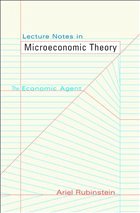Lecture Notes in Microeconomic Theory is the first publication of Ariel Rubinstein's lecture notes from the first part of his well-known course in microeconomic theory, which he has taught for fifteen years to first-year graduate students at Tel Aviv, Princeton, and New York universities. The book will be an invaluable supplement to primary textbooks in microeconomic theory. Conveying the style and method of Rubinstein's lectures, it will benefit teachers and research economists as well as students. The book focuses on and provides a critical assessment of models of rational economic agents, and it contains a large number of original problems.
Rubinstein, one of the world's most-respected economics theorists, has made substantial contributions to several fields in economics, particularly game theory. His work is characterized by an unusual combination of deep originality and surprising simplicity. He is probably best known for his contributions to the bargaining problem and, more recently, to bounded rationality.
Table of contents:
Preface vii
Introduction ix
Lecture 1. Preferences 1
Problem Set 1 10
Lecture 2. Utility 12
Problem Set 2 21
Lecture 3. Choice 24
Problem Set 3 37
Lecture 4. Consumer Preferences 40
Problem Set 4 50
Lecture 5. Demand:Consumer Choice 52
Problem Set 5 66
Lecture 6. Choice over Budget Sets and the Dual Problem 68
Problem Set 6 76
Lecture 7. Production 79
Problem Set 7 85
Lecture 8. Expected Utility 87
Problem Set 8 97
Lecture 9. Risk Aversion 100
Problem Set 9 112
Lecture 10. Social Choice 114
Problem Set 10 122
Review Problems 124
References 131
"Ariel Rubinstein is one of the most original and provocative theorists of his generation. These notes, coming from his teaching of graduate microeconomics, exhibit his originality and clarity of thought. Students interested in mastering the foundations of microeconomics will benefit from studying these notes in conjunction with one of the more standard texts."--David M. Kreps, Paul E. Holden Professor of Economics, Graduate School of Business, Stanford University, and author of A Course in Microeconomic Theory (Princeton)
"This book will be a valuable addition to the small collection of high-level texts in microeconomics. It is distinguished by Rubinstein's characteristic skill in choice of topics and exposition, and by his unique perspective on economic theory and game theory. At the same time, it will be accessible to a wide range of students."--Vincent Crawford, Distinguished Professor of Economics, University of California at San Diego
"Ariel Rubinstein is one of the most thoughtful economic theorists. His lecture notes clearly distinguish between rationality-based models as useful objects of mathematical study, and using other kinds of math to incorporate psychological limits on rationality in a disciplined way. This two-pronged perspective gives the book a distinctive twist. It will be widely used by students and teachers, and its interesting ideas about bounded rationality and behavior are unique."--Colin F. Camerer, Axline Professor of Business Economics, Caltech, and author of Behavioral Game Theory (Princeton/Russell Sage Foundation)
Rubinstein, one of the world's most-respected economics theorists, has made substantial contributions to several fields in economics, particularly game theory. His work is characterized by an unusual combination of deep originality and surprising simplicity. He is probably best known for his contributions to the bargaining problem and, more recently, to bounded rationality.
Table of contents:
Preface vii
Introduction ix
Lecture 1. Preferences 1
Problem Set 1 10
Lecture 2. Utility 12
Problem Set 2 21
Lecture 3. Choice 24
Problem Set 3 37
Lecture 4. Consumer Preferences 40
Problem Set 4 50
Lecture 5. Demand:Consumer Choice 52
Problem Set 5 66
Lecture 6. Choice over Budget Sets and the Dual Problem 68
Problem Set 6 76
Lecture 7. Production 79
Problem Set 7 85
Lecture 8. Expected Utility 87
Problem Set 8 97
Lecture 9. Risk Aversion 100
Problem Set 9 112
Lecture 10. Social Choice 114
Problem Set 10 122
Review Problems 124
References 131
"Ariel Rubinstein is one of the most original and provocative theorists of his generation. These notes, coming from his teaching of graduate microeconomics, exhibit his originality and clarity of thought. Students interested in mastering the foundations of microeconomics will benefit from studying these notes in conjunction with one of the more standard texts."--David M. Kreps, Paul E. Holden Professor of Economics, Graduate School of Business, Stanford University, and author of A Course in Microeconomic Theory (Princeton)
"This book will be a valuable addition to the small collection of high-level texts in microeconomics. It is distinguished by Rubinstein's characteristic skill in choice of topics and exposition, and by his unique perspective on economic theory and game theory. At the same time, it will be accessible to a wide range of students."--Vincent Crawford, Distinguished Professor of Economics, University of California at San Diego
"Ariel Rubinstein is one of the most thoughtful economic theorists. His lecture notes clearly distinguish between rationality-based models as useful objects of mathematical study, and using other kinds of math to incorporate psychological limits on rationality in a disciplined way. This two-pronged perspective gives the book a distinctive twist. It will be widely used by students and teachers, and its interesting ideas about bounded rationality and behavior are unique."--Colin F. Camerer, Axline Professor of Business Economics, Caltech, and author of Behavioral Game Theory (Princeton/Russell Sage Foundation)

